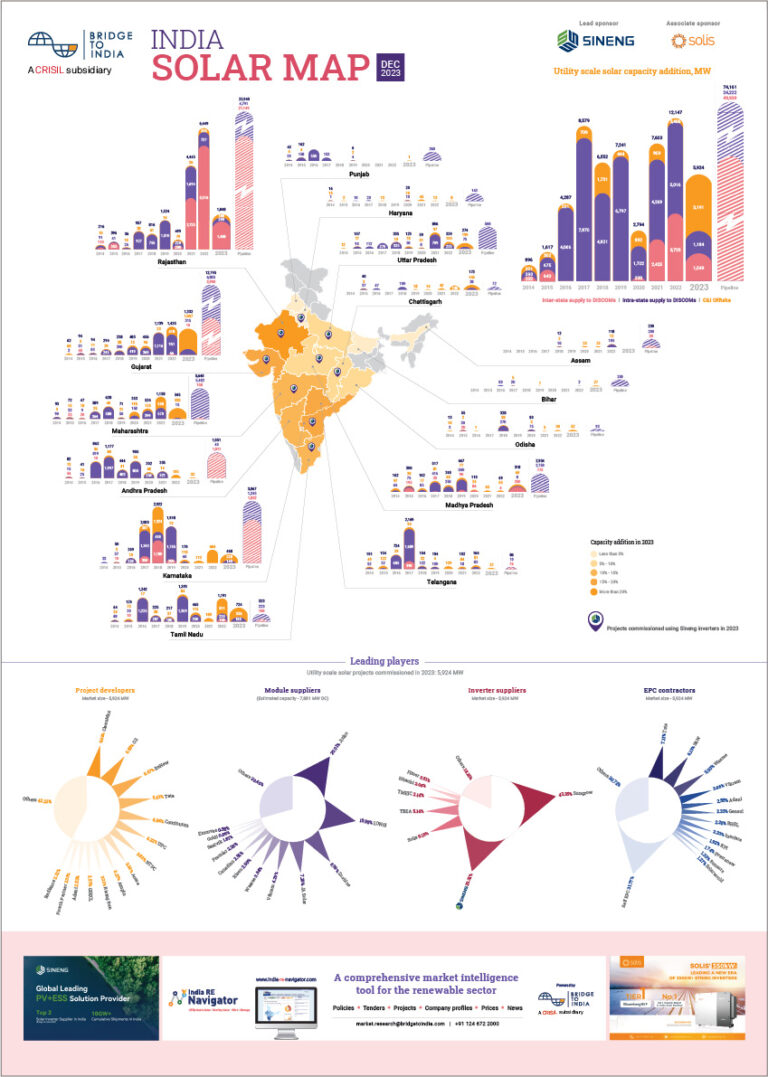BRIDGE TO INDIA interviewed the Aditya Birla Group for the INDIA SOLAR HANDBOOK for their views on the solar market in India. Mr. Ravi Khanna serves as Chief Executive Officer of the Solar Power Business of the Aditya Birla Group. BRIDGE TO INDIA garners an understanding of the motives, scope and strategies behind its solar incentives.
As a developer in the Indian solar market, the Aditya Birla Group is keen on operating projects under the REC/RPO mechanism. According to the company:
- Both small scale projects – around industrial townships, mining facilities and telecom towers – as well as larger projects under the NSM or through REC mechanisms are viable options
- The lack of enforcements and unclear regulations in the REC market stunt the access to capital
BTI: Why has the Aditya Birla Group decided to develop solar power projects in India?
RK: The Aditya Birla Group is committed to sustainable business practices and environmental conservation. Towards sustainable resource management and furthering the growth of alternative energy in India, the Group has decided to participate in the development of solar power in India. We have taken a conscious decision to voluntarily align our energy portfolio and ensure that a sizable portion of energy comes from renewable sources.
BTI: What are the sizes of projects that you are looking to develop? Will these be under the NSM or state policies?
RK: We are looking at various opportunities independent of scale. Among small scale projects, we have evaluated setting up decentralized solar power projects for community development in and around our industrial townships, mining facilities as well as for our telecom towers. We are also keen on developing large scale projects under the grid connected policies – be it the National Solar Mission, existing or forthcoming state policies as well as the independent REC/RPO mechanism.
BTI: As a large business conglomerate, you face RPOs for your different businesses. What is your strategy to meet these obligations?
RK: As one of the largest private consumers and captive generators of power, we will of course adhere to all regulatory obligations as they are mandated in the future. However, we are seeking to move proactively to make sure that we can address these obligations promptly and efficiently. In any large corporation, there will be a mix of activities to meet the stated target including purchase of certificates, own generation, purchase of renewable power and so on.
BTI: Is the solar REC market viable? Are you looking to develop projects based on the REC mechanism?
RK: For a business venture, a stable regulatory environment is essential. This enables a fair analysis of the market risks to be managed. The REC market today faces certain challenges – the key being the lack of clarity on the enforcement of RPOs and its impact on the REC prices in the future. The regulation itself is a well thought out document, but due to enforcement issues businesses are slow in committing capital on the scale that is required. The market will remain stunted without access to capital or finance until the concerns relating to enforcement are addressed. Other problems that are systemic to the power sector such as the development of evacuation infrastructure, intra and interstate transfer of energy and payment from the state distribution companies (DISCOMS) can all be addressed in parallel after the resolution of the key issue of enforcement. We, at the Aditya Birla Group, are keen to develop projects under the REC/RPO mechanism both for sale of power to our units and to other companies that may require such power as well as to supply certificates to the exchange to help facilitate the REC process.
BTI: What are the key factors that govern your decision on the purchase of modules?
RK: The key considerations that we look at for the purchase of modules fall under three broad heads – quality, effectiveness and price. Under quality we look at the warranty and guarantee conditions that the module supplier provides, the rate of degradation and the health of the company backing the module. In cases where we have limited land availability or where land is costly, the efficiency becomes important. Under effectiveness we explore the type of guarantee provided – whether it is linear or flat, the size of the bankability reports of the company providing the module and the related balance of system costs for that particular module. Under price considerations, cost, payment terms and delivery schedule are key.
Look out for BRIDGE TO INDIA’s analysis on ‘Viability of the REC Mechanism in India’.
For more information on the Indian solar market, visit our Reports page or Contact us.












